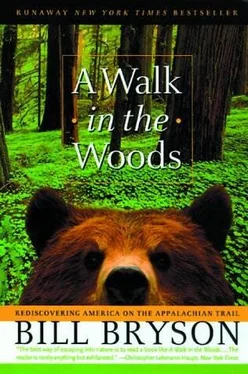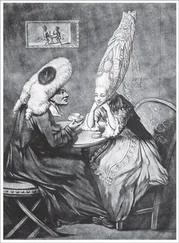Bill Bryson - A Walk In The Woods
Здесь есть возможность читать онлайн «Bill Bryson - A Walk In The Woods» весь текст электронной книги совершенно бесплатно (целиком полную версию без сокращений). В некоторых случаях можно слушать аудио, скачать через торрент в формате fb2 и присутствует краткое содержание. Жанр: Современная проза, на английском языке. Описание произведения, (предисловие) а так же отзывы посетителей доступны на портале библиотеки ЛибКат.
- Название:A Walk In The Woods
- Автор:
- Жанр:
- Год:неизвестен
- ISBN:нет данных
- Рейтинг книги:4 / 5. Голосов: 1
-
Избранное:Добавить в избранное
- Отзывы:
-
Ваша оценка:
- 80
- 1
- 2
- 3
- 4
- 5
A Walk In The Woods: краткое содержание, описание и аннотация
Предлагаем к чтению аннотацию, описание, краткое содержание или предисловие (зависит от того, что написал сам автор книги «A Walk In The Woods»). Если вы не нашли необходимую информацию о книге — напишите в комментариях, мы постараемся отыскать её.
A Walk In The Woods — читать онлайн бесплатно полную книгу (весь текст) целиком
Ниже представлен текст книги, разбитый по страницам. Система сохранения места последней прочитанной страницы, позволяет с удобством читать онлайн бесплатно книгу «A Walk In The Woods», без необходимости каждый раз заново искать на чём Вы остановились. Поставьте закладку, и сможете в любой момент перейти на страницу, на которой закончили чтение.
Интервал:
Закладка:
“G’ won ,” she encouraged.
Katz held up a palm. “I’m reformed.”
“Yew are ? Well, good for you. Have a drink then.”
“No really.”
“How ’bout yew?” she said to me.
“Oh, no thanks.” I couldn’t have freed my pinned arms even if I had wanted a drink. They dangled before me like tyrannosaur limbs.
“Yer not reformed, are ya?”
“Well, kind of.” I had decided, for purposes of solidarity, to forswear alcohol for the duration.
She looked at us. “You guys like Mormons or something?”
“No, just hikers.”
She nodded thoughtfully, satisfied with that, and had a drink. Then she made Darren jump again.
They dropped us at Mull’s Motel in Hiawassee, an old-fashioned, nondescript, patently nonchain establishment on a bend in the road near the center of town. We thanked them profusely, went through a little song-and-dance of trying to give them gas money, which they stoutly refused, and watched as Darren returned to the busy road as if fired from a rocket launcher. I believe I saw him bang his head again as they disappeared over a small rise.
And then we were alone with our packs in an empty motel parking lot in a dusty, forgotten, queer-looking little town in northern Georgia. The word the clings to every hiker’s thoughts in north Georgia is Deliverance , the 1970 novel by James Dickey that was made into a Hollywood movie. It concerns, as you may recall, four middle-aged men from Atlanta who go on a weekend canoeing trip down the fictional Cahulawasee River (but based on the real, nearby chattooga) and find themselves severely out of their element. “Every family I’ve ever met up here has at least one relative in the penitentiary,” a character in the book remarks forebodingly as they drive up. “Some of them are in for making liquor or running it, but most of them are in for murder. They don’t think a whole lot about killing people up here.” And so of course it proves, as our urban foursome find themselves variously buggered, murdered, and hunted by a brace of demented backwoodsmen.
Early in the book Dickey has his characters stop for directions in some “sleepy and hookwormy and ugly” town, which for all I know could have been Hiawassee. What is certainly true is that the book was set in this part of the state, and the movie was filmed in the area. The famous banjo-plucking albino who played “Dueling Banjos” in the movie still apparently lives in Clayton, just down the road.
Dickey’s book, as you might expect, attracted heated criticism in the state when it was published (one observer called it “the most demeaning characterization of southern highlanders in modern literature,” which, if anything, was an understatement), but in fact it must be said that people have been appalled by northern Georgians for 150 years. One nineteenth-century chronicler described the region’s inhabitants as “tall, thin, cadaverous-looking animals, as melancholy and lazy as boiled cod-fish,” and others freely employed words like “depraved,” “rude,” “uncivilized,” and “backward” to describe the reclusive, underbred folk of Georgia’s deep, dark woods and desperate townships. Dickey, who was himself a Georgian and knew the area well, swore that his book was a faithful description.
Perhaps it was the lingering influence of the book, perhaps simply the time of day, or maybe nothing more than the unaccustomedness of being in a town, but Hiawassee did feel palpably weird and unsettling-the kind of place where it wouldn’t altogether surprise you to find your gasoline being pumped by a cyclops. We went into the motel reception area, which was more like a small, untidy living room than a place of business, and found an aged woman with lively white hair and a bright cotton dress sitting on a sofa by the door. She looked happy to see us.
“Hi,” I said. “We’re looking for a room.”
The woman grinned and nodded.
“Actually, two rooms if you’ve got them.”
The woman grinned and nodded again. I waited for her to get up, but she didn’t move.
“For tonight,” I said encouragingly. “You do have rooms?” Her grin became a kind of beam and she grasped my hand, and held on tight; her fingers felt cold and bony. She just looked at me intently and eagerly, as if she thought-hoped-that I would throw a stick for her to fetch.
“Tell her we come from Reality Land,” Katz whispered in my ear.
At that moment, a door swung open and a grey-haired woman swept in, wiping her hands on an apron.
“Oh, ain’t no good talking to her,” she said in a friendly manner. “She don’t know nothing, don’t say nothing. Mother, let go the man’s hand.” Her mother beamed at her. “Mother, let go the man’s hand.”
My hand was released and we booked into two rooms. We went off with our keys and agreed to meet in half an hour. My room was basic and battered-there were cigarette burns on every possible surface, including the toilet seat and door lintels, and the walls and ceiling were covered in big stains that suggested a strange fight to the death involving lots of hot coffee-but it was heaven to me. I called Katz, for the novelty of using a telephone, and learned that his room was even worse. We were very happy.
We showered, put on such clean clothes as we could muster, and eagerly repaired to a popular nearby bistro called the Georgia Mountain Restaurant. The parking lot was crowded with pickup trucks, and inside it was busy with meaty people in baseball caps. I had a feeling that if I’d said, “Phone call for you, Bubba,” every man in the room would have risen. I won’t say the Georgia Mountain had food I would travel for, even within Hiawassee, but it was certainly reasonably priced. For $5.50 each, we got “meat and three,” a trip to the salad bar, and dessert. I ordered fried chicken, black-eyed peas, roast potatoes, and “ruterbeggars,” as the menu had it-I had never had them before, and can-t say I will again. We ate noisily and with gusto, and ordered many refills of iced tea.
Dessert was of course the highlight. Everyone on the trail dreams of something, usually sweet and gooey, and my sustaining vision had been an outsized slab of pie. It had occupied my thoughts for days, and when the waitress came to take our order I asked her, with beseeching eyes and a hand on her forearm, to bring me the largest piece she could slice without losing her job. She brought me a vast, viscous, canary-yellow wedge of lemon pie. It was a monument to food technology, yellow enough to give you a headache, sweet enough to make your eyeballs roll up into your head-everything, in short, you could want in a pie so long as taste and quality didn’t enter into your requirements. I was just plunging into it when Katz broke a long silence by saying, with a strange kind of nervousness, “You know what I keep doing? I keep looking up to see if Mary Ellen’s coming through the door.”
I paused, a forkful of shimmering goo halfway to my mouth, and noticed with passing disbelief that his dessert plate was already empty. “You’re not going to tell me you miss her, Stephen?” I said dryly and pushed the food home.
“No,” he responded tartly, not taking this as a joke at all. He took on a frustrated look from trying to find words to express his complex emotions. “We did kind of ditch her, you know,” he finally blurted.
I considered the charge. “Actually, we didn’t kind of ditch her. We ditched her.” I was’t with him at all on this. “So?”
“Well, I just, I just feel kind of bad-just kind of bad-that we left her out in the woods on her own.” Then he crossed his arms as if to say: “There. I’ve said it.”
I put my fork down and considered the point. “She came into the woods on her own,” I said. “We’re not actually responsible for her, you know. I mean, it’s not as if we signed a contract to look after her.”
Читать дальшеИнтервал:
Закладка:
Похожие книги на «A Walk In The Woods»
Представляем Вашему вниманию похожие книги на «A Walk In The Woods» списком для выбора. Мы отобрали схожую по названию и смыслу литературу в надежде предоставить читателям больше вариантов отыскать новые, интересные, ещё непрочитанные произведения.
Обсуждение, отзывы о книге «A Walk In The Woods» и просто собственные мнения читателей. Оставьте ваши комментарии, напишите, что Вы думаете о произведении, его смысле или главных героях. Укажите что конкретно понравилось, а что нет, и почему Вы так считаете.












